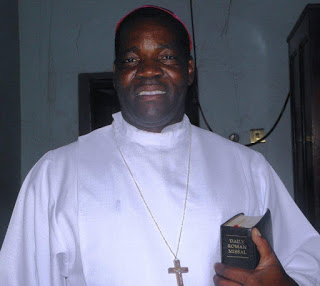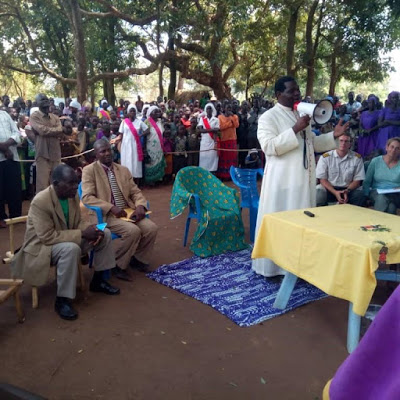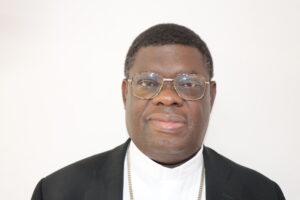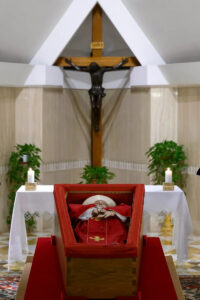SOUTH SUDAN: Teaching Poverty a Lesson: Diocese of Tombura-Yambio’s Poverty Alleviation Strategy

Rt. Rev. Edwardo Hiiboro, Bishop of Tombura-Yambio Diocese
Tunaomba serikali atusaidie, ‘We are appealing to Government to help us’, is an expression that is synonymous to situations of desperation and neediness in Kenya. It is an expression of helplessness by local people in the face of calamities, often showcased by the media that it has become akin to a joke. This is due to the fact that even in situations where people can easily work things out for themselves if only they try to, the call for government support never fails on their lips.
Rt. Rev. Edward Hiiboro Kussala, Bishop of Tombura-Yambio Diocese in South Sudan believes that poverty is not something that is prescribed for African countries but rather, it is as a result of people being used to receiving things, to be supported, hence the persistence of poverty in African, generations after generations.
On this basis, the Diocese of Tombura-Yambio is working on empowering the local people to take initiatives towards building resources for themselves under the slogan ‘Teaching Poverty a Lesson.’
“Many times poverty becomes an ordinary thing. People lack food, medicine, proper roads; they cannot afford to take their children to school or afford to pay their medical bills – and they would say that it is the will of God. I, as a bishop, would not like to watch this kind of narrative continue in my Diocese. I refuse to allow people from my diocese to continue sitting and waiting for manner. It is not right,” Bishop Hiiboro expressed.
“Genesis chapter one tells us that God did not create us into poverty, into hunger, into disease and into nothingness. He made provisions in the garden and gave us everything. So it is a sin to sit and wait for somebody else to come and give you what you can get for yourself. I am not contradicting charity, I’m not contradicting solidarity, and I am not contradicting support for the needy people among us. What I am saying is that by our nature, fulfilling the dream of God for humanity means that we must co-create with God.”

Bishop Hiiboro who is also the President of Sudan and South Sudan Catholic Bishops Conference (SSSCBC) says that the policy in his diocese is to make people realize that poverty is a monster that they should not get comfortable with.
“We must teach poverty a lesson by first acknowledging our being uniquely created by God; secondly by joining with God in re-creating the world wherever we are living for it is our duty to cultivate that which God provides into something useful; thirdly, we must acknowledge that poverty is stubborn, hence we must be alert and not give it a chance,” Bishop Hiiboro explained.
He adds that in a very practical sense, teaching poverty a lesson means that people should have food to eat; that since our land is fertile, people should be able to grow enough food for themselves and have a surplus to sell and acquire other essentials.
“Another thing is to teach ourselves the culture of work, the holiness of work as Saint Paul says, … he who does not work, neither shall he eat, on 2 Thessalonians 3:10. By working, we are practically teaching poverty a lesson. The final thing to do in order to teach poverty a lesson is to train the family members to be sensitive to their needs – needs of the children, husband, and wife. When people are sensitive about their needs, they become compelled to work hard towards providing for it this is actually what we are doing.”
Bishop Hiiboro attests that teaching poverty a lesson is not any easy task owing to the fact that the majority of people they are dealing with have for a long time cultivated a culture of dependency. The first huddle therefore is about changing their mind-set.
“We are trying to change the people’s mind-set by making them realize that they are capable of getting what they need. This can be realized by working hard rather than sitting around and expecting for Manna to come from Heaven. We have to work towards changing their heart so that they can accept to receive this message and believe in themselves. We are doing this through workshops and through personal contacts,” the Bishop explained, adding that he has allocated time for individual contacts and he encourages my pastoral collaborators in the diocese to do the same especially with the opinion leaders in the society.
Additionally, the diocese uses champions, people who have managed to work hard and improve their lives. According to Bishop Hiiboro, these champions become the role models that the diocese uses train others.
“We empower those who are already doing something for themselves; we encourage them to continue with the spirit and to pull others around them in order to move on together. Finally, we use also the modern technology, the social media to talk about how to improve our communities through management of the resources that we have.”
∽End∽
By Pamela Adinda, AMECEA Online News


